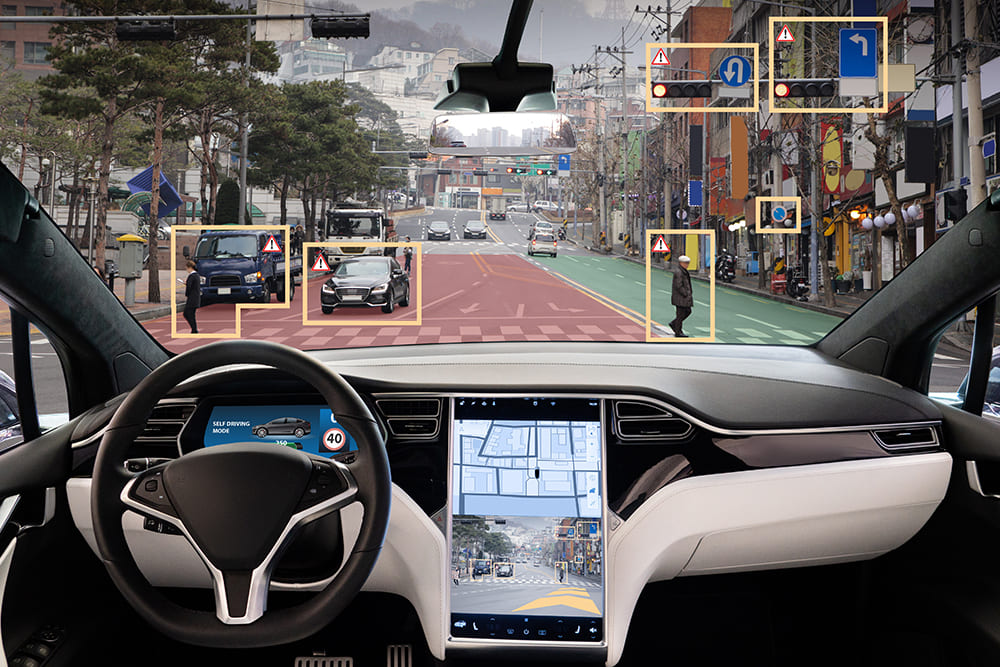Artificial intelligence (AI) replicates human decision/thinking abilities using data and algorithms. Financial services, information and communication technology (ICT), life science, retail, healthcare, industrial manufacturing, automotive, oil and gas, and chemicals are all using algorithms to help their systems learn and solve problems on their own.
See Also: The Future of Transportation: Flying Cars & More
Artificial Intelligence & Manufacturing
With the use of AI, robots are working alongside humans while also learning automobile manufacturing skills. Currently, AI is assisting humans in the development of automobiles. Through the use of Exoskeletons; in the future, these AI-powered robots will be able to operate the entire factory.
Transportation
The transportation industry is being transformed by artificial intelligence. AI is currently playing an important part in driver assistance technology, and it is widely deployed in modern vehicles. Tesla now offers level 2 autonomous vehicles, and the company plans to introduce level 4/5 autonomous vehicles by the end of 2020. AI can be used to monitor the driver’s eye, determining whether or not the driver is sleeping or weary.
Services
AI has the potential to play a key role in aftermarket service. Currently, many AI apps foresee potential difficulties with engine performance, battery performance, and so forth. Furthermore, there are several AI-powered insurance providers who provide customers with speedy services, such as insurance and claim settlements.
Artificial Intelligence & The Road Ahead
Artificial intelligence is being implemented at a glacial pace in the automotive industry. In 2015, 5-10% of automobiles had some type of AI system fitted. AI has been applied for parking assistance, cruise control, and level 1 and 2 autonomous vehicles in the previous five years, resulting in increasing technology adoption. AI technology is likely to be used in a variety of automotive applications during the next 8-10 years. As a result, by the end of 2030, it is possible that 95-98% of new automobiles would contain AI technology.
The Effect on Autonomous Vehicles Market
Increased AI penetration is predicted to drive demand for autonomous vehicles over the next 8-10 years. According to FutureBridge forecasts, autonomous vehicle sales accounted for 33 million units in 2019, with the industry predicted to reach 80 million units by 2030, with a CAGR of 8-10% between 2019 and 2030.
AI is the foundation of self-driving and connected cars. According to market estimates, by the end of 2030, around 85% of automobiles will be (to some extent) autonomous. However, very few countries now have enabling infrastructure (such as roads, legislation, and standards) for autonomous driving. Most developed countries (including the United States, Canada, Germany, the United Kingdom, China, and Japan) will have enhanced infrastructure for autonomous vehicles by 2025. Level 3 autonomous vehicles will be increasingly ubiquitous by the end of 2030, with level 4 and level 5 following suit.
Future Automotive OEMs – Technology Providers
Traditionally, internal combustion engine manufacturers dominated car manufacturing, with backing from part makers, technology providers, and so on. Multiple market drivers, such as the rise of electric vehicles and the strength of internet connectivity, have allowed new entrants into the automotive business. Currently, the vehicle brand is known by the manufacturer of its engine. However, during the next ten years, the vehicle will be known by the provider of its software (which includes autonomous driving technology powered by AI, enhanced infotainment system, and so on). Technology companies such as Google, Baidu, Amazon, and Uber are launching self-driving cars. Part suppliers in this case include car body, chassis, and battery manufacturers.



















